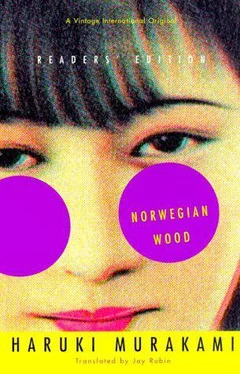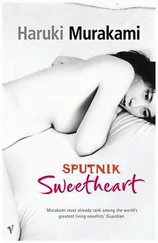Naoko asked me one time - just once - if I had a girl I liked. I told her about the one I had left behind in Kobe. "She was nice," I said, "I enjoyed sleeping with her, and I miss her every now and then, but finally, she didn't move me. I don't know, sometimes I think I've got this hard kernel in my heart, and nothing much can get inside it. I doubt if I can really love anybody."
"Have you ever been in love?" Naoko asked.
"Never," I said.
She didn't ask me more than that.
When autumn ended and cold winds began tearing through the city, Naoko would often walk pressed against my arm. I could sense her breathing through the thick cloth of her duffel coat. She would entwine her arm with mine, or cram her hand in my pocket, or, when it was really cold, cling tightly to my arm, shivering. None of this had any special meaning. I just kept walking with my hands shoved in my pockets. Our rubber-soled shoes made hardly any sound on the pavement, except for the dry crackling when we trod on the broad, withered sycamore leaves. I felt sorry for Naoko whenever I heard that sound. My arm was not the one she needed, but the arm of someone else. My warmth was not what she needed, but the warmth of someone else. I felt almost guilty being me.
As the winter deepened, the transparent clarity of Naoko's eyes seemed to increase. It was a clarity that had nowhere to go. Sometimes Naoko would lock her eyes on to mine for no apparent reason. She seemed to be searching for something, and this would give me a strange, lonely, helpless sort of feeling.
I wondered if she was trying to convey something to me, something she could not put into words - something prior to words that she could not grasp within herself and which therefore had no hope of ever turning into words. Instead, she would fiddle with her hairslide, dab at the corners of her mouth with a handkerchief, or look into my eyes in that meaningless way. I wanted to hold her tight when she did these things, but I would hesitate and hold back. I was afraid I might hurt her. And so the two of us kept walking the streets of Tokyo, Naoko searching for words in space.
The guys in the dorm would always tease me when I got a call from Naoko or went out on a Sunday morning. They assumed, naturally enough, that I had found a girlfriend. There was no way to explain the truth to them, and no need to explain it, so I let them think what they wanted to. I had to face a barrage of stupid questions in the evening - what position had we used? What was she like down there? What colour underwear had she been wearing that day? I gave them the answers they wanted.
And so I went from 18 to 19. Each day the sun would rise and set, the flag would be raised and lowered. Every Sunday I would have a date with my dead friend's girl. I had no idea what I was doing or what I was going to do. For my courses I would read Claudel and Racine and Eisenstein, but they meant almost nothing to me. I made no friends at the lectures, and hardly knew anyone in the dorm. The others in the dorm thought I wanted to be a writer because I was always alone with a book, but I had no such ambition. There was nothing I wanted to be.
I tried to talk about this feeling with Naoko. She, at least, would be able to understand what I was feeling with some degree of precision, I thought. But I could never find the words to express myself. Strange, I seemed to have caught her word-searching sickness.
On Saturday nights I would sit by the phone in the lobby, waiting for Naoko to call. Most of the others were out, so the lobby was usually deserted. I would stare at the grains of light suspended in that silent space, struggling to see into my own heart. What did I want? And what did others want from me? But I could never find the answers.
Sometimes I would reach out and try to grasp the grains of light, but my fingers touched nothing.
I read a lot, but not a lot of different books: I like to read my favourites again and again. Back then it was Truman Capote, John Updike, F. Scott Fitzgerald, Raymond Chandler, but I didn't see anyone else in my lectures or the dorm reading writers like that. They liked Kazumi Takahashi, Kenzaburo Oe, Yukio Mishima, or contemporary French novelists, which was another reason I didn't have much to say to anybody but kept to myself and my books. With my eyes closed, I would touch a familiar book and draw its fragrance deep inside me. This was enough to make me happy.
At 18 my favourite book was John Updike's The Centaur, but after I had read it a number of times, it began to lose some of its initial lustre and yielded first place to The Great Gatsby. Gatsby stayed in first place for a long time after that. I would pull it off the shelf when the mood hit me and read a section at random. It never once disappointed me. There wasn't a boring page in the whole book. I wanted to tell people what a wonderful novel it was, but no one around me had read The Great Gatsby or was likely to. Urging others to read F Scott Fitzgerald, although not a reactionary act, was not something one could do in 1968.
When I did finally meet the one person in my world who had read Gatsby, he and I became friends because of it. His name was Nagasawa. He was two years older than me, and because he was doing legal studies at the prestigious Tokyo University, he was on the fast track to national leadership. We lived in the same dorm and knew each other only by sight, until one day when I was reading Gatsby in a sunny spot in the dining hall. He sat down next to me and asked what I was reading. When I told him, he asked if I was enjoying it. "This is my third time," I said, "and every time I find something new that I like even more than the last."
"This man says he has read The Great Gatsby three times," he said as if to himself. "Well, any friend of Gatsby is a friend of mine."
And so we became friends. This happened in October.
The better I got to know Nagasawa, the stranger he seemed. I had met a lot of weird people in my day, but none as strange as Nagasawa. He was a far more voracious reader than me, but he made it a rule never to touch a book by any author who had not been dead at least 30 years.
"That's the only kind of book I can trust," he said.
"It's not that I don't believe in contemporary literature," he added, "but I don't want to waste valuable time reading any book that has not had the baptism of time. Life is too short."
"What kind of authors do you like?" I asked, speaking in respectful tones to this man two years my senior.
"Balzac, Dante, Joseph Conrad, Dickens," he answered without hesitation.
"Not exactly fashionable."
"That's why I read them. If you only read the books that everyone else is reading, you can only think what everyone else is thinking. That's the world of hicks and slobs. Real people would be ashamed of themselves doing that. Haven't you noticed, Watanabe? You and I are the only real ones in this dorm. The other guys are crap."
This took me off guard. "How can you say that?"
"'Cause it's true. I know. I can see it. It's like we have marks on our foreheads. And besides, we've both read The Great Gatsby."
I did some quick calculating. "But Fitzgerald's only been dead 28 years," I said.
"So what? Two years? Fitzgerald's advanced."
No one else in the dorm knew that Nagasawa was a secret reader of classic novels, nor would it have mattered if they had. Nagasawa was known for being smart. He breezed into Tokyo University, he got good marks, he would take the Civil Service Exam, join the Foreign Ministry, and become a diplomat. He came from a wealthy family. His father owned a big hospital in Nagoya, and his brother had also graduated from Tokyo, gone on to medical school, and would one day inherit the hospital. Nagasawa always had plenty of money in h is pocket, and he carried himself with real dignity. People treated him with respect, even the dorm Head. When he asked someone to do something, the person would do it without protest. There was no choice in the matter.
Читать дальше












